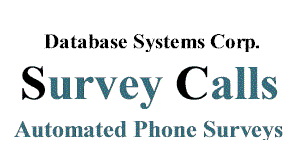|
|



Post Transaction Surveys
 Automatic phone surveying is an economical and highly accurate method of collecting information by phone.. There are many advantages of automated phone surveys. Studies have indicated that automated surveys are more accurate than surveys conducted using live operators.
Automatic phone surveying is an economical and highly accurate method of collecting information by phone.. There are many advantages of automated phone surveys. Studies have indicated that automated surveys are more accurate than surveys conducted using live operators.
Database Systems Corp. (DSC) was incorporated in 1978 and has been a leading developer of computer software and phone systems. Using this advanced technology, DSC provides phone surveys and custom phone applications for a wide variety of industries and governments.
The following article describes information about phone surveys and phone survey techniques.
Contact DSC to learn more about our phone survey development and automatic survey outsourcing services.
Post Transaction Telephone Surveys
This is an introduction on how to collect customer feedback via post-transaction (post-call) telephone surveys. This type of survey is conducted at the end of a phone call with a customer - after you've helped them, but before they've hung up. This type of survey is primarily conducted in contact centers. Post-transaction surveys collect timely feedback about an interaction immediately after it took place, and can provide insight into the overall customer experience.
Survey basics
1.What are post-transaction (post-call) telephone surveys?
2.Why would you conduct this type of survey?
3.How could your agency use the feedback from these surveys?
Survey participants
1.How do you identify potential survey participants?
2.What are some limitations of post-transaction phone surveys?
3.How are these surveys taken?
Survey design
1.How do these surveys differ from other types of surveys?
2.Are there any survey and question design tips?
3.Should you collect personally identifiable information?
4.What factors influence survey response rates?
5.What factors can influence the reliability of survey responses?
Operational details
1.From whom should you get buy-in prior to launching one of these surveys?
2.Should you test your survey prior to launch?
3.How much would it cost for your agency to run this type of survey?
Survey basics
1. What are post-transaction (post-call) telephone surveys?
They are surveys conducted immediately after a customer has called in and interacted with your agency, but before the customer has hung up. You ask the customer questions after you've concluded the transaction, while you still have them on the line. (Post-call surveys can also be conducted via an outbound call after a phone interaction, or through an email survey.)
2. Why would you conduct this type of survey?
Post-transaction surveys are particularly useful if your agency has a call center, or has significant interaction with customers over the phone. The feedback collected by this type of survey can provide insight about specific transactions, as well as the overall customer experience. In addition, you can avoid the difficulty and expense of proactively reaching out to the customer again. Examples of questions that could be answered through this type of survey include:
- a. Did the customer service representative provide the information/answer you needed?
[yes or no]
- b. How satisfied are you with the overall call experience?
[1 = very dissatisfied to 5 = very satisfied]
- c. How satisfied are you with your wait time?
[1 = not satisfied to 5 = very satisfied]
3. How could your group use the feedback from these surveys?
Examples include:
- Setting performance goals, establishing performance metrics and setting service standards. For example, establish baseline metrics for customer satisfaction, and take action if satisfaction dips.
- Training and coaching. Customer feedback can often be tied to a specific customer service representative interaction and used for coaching or training purposes. Feedback can be aggregated to identify areas for improvement by frontline customer service staff.
- Improving contact center processes. Phone surveys can help pinpoint exactly where a customer became dissatisfied with an interaction.
- Improving business processes. Feedback can be shared with other parts of your agency to improve processes. For example, survey results could reveal that a customer has called multiple times about the same issue. This could help you uncover problems with a specific business process, and the feedback can help your agency make improvements.
- Identifying areas for more in-depth investigation. Customer feedback could be used to investigate a problem area in more detail.
Survey participants
1. How do you identify potential survey participants?
Respondents are usually asked if they are willing to fill out a survey at the beginning or end of the phone call. This can be done through an Interactive Voice Response (IVR) system at the beginning of the call, or by a customer service rep during the call. These surveys are typically voluntary. For outbound phone or email surveys, potential participant lists can be created with contact information from recent callers (if your agency has gone through proper clearance procedures to collect this information.)
2. What are some limitations of post-transaction phone surveys?
Your survey population is limited to customers who call your contact center or agency - typically these customers have information requests or complaints. This group will not necessarily be representative of your entire customer base, nor of the customers accessing your agency via other channels. In addition, the survey is not a random sample and consists only of customers who choose to participate.
3. How are these surveys taken?
The survey can be conducted by the customer service representative who handled the call, a different customer service representative, an outside third party, or an automated survey handled through the Interactive Voice Response (IVR) system.
The resources required for these options vary. The IVR survey requires having IVR technology in place, and the in-person options will require more staff time to complete.
The results from an IVR survey may be less biased than those acquired through a live interaction for two reasons: 1) The survey is automated, so the questions are delivered the same way each time; and 2) customers are more likely to give an honest opinion when they are not interacting with a live individual (particularly if that individual is the same rep who handled their interaction).
Survey design
1. How do these surveys differ from other types of surveys?
Post-transaction phone surveys tend to focus primarily on the transaction that just took place. The surveys are short, with a small number of questions that can be answered in less than 5 minutes (the longer the survey, the more likely the participant will hang up). Question format varies, but questions tend to be less complex than those found in online or written surveys. Questions are brief and closed-ended, with open-ended questions (if there are any) included at the end of the survey.
2. Are there any survey and question design tips?
3. Should you collect personally identifiable information?
Linking survey responses to specific customer interactions can be helpful for coaching and training purposes, as well as for responding directly to an individual complaint or dissatisfied customer. In addition, demographic details can also be used to better understand your customer base. However, bear in mind federal agencies must adhere to all privacy laws, and it is important to be cognizant of these laws when collecting information. If you would like to take advantage of the five-day fast-track PRA assessment process, you should not collect any personally identifiable information, although you may still be able to ask for certain demographic information (e.g., age and location).
4. What factors influence survey response rates?
The biggest factor influencing response rates is the strength of the relationship between the customer and the agency, and the interest or relationship that the respondents have in the survey topic (the stronger these relationships, the better the response rate). Live surveys also tend to have a lower abandonment rate than IVR surveys.
Other factors that influence response rate include the length of the survey (longer surveys tend to have lower response rates) and the sensitivity of the questions. Well-constructed surveys, with questions relevant to respondents, will also increase response rate. In addition, different customer segments will have different response rates. For example, senior citizens may have more time to fill out a survey (although they may be less likely to be online).
5. What factors can influence the reliability of survey responses?
See the Survey and Question Design Overview for more details. In general, shorter surveys often yield more reliable responses than longer ones (as do questions asked at the beginning rather than end of a survey). How soon the survey is completed after the interaction can also influence reliability. Feedback collected immediately after an interaction is more accurate than feedback collected 24 hours after the event. Also, the more difficult a question is to understand or answer, the less accurate the response (especially on the phone, where respondents cannot reread the question).
Operational details
1. From whom should you get buy-in prior to launching one of these surveys?
It is helpful to get buy-in from key stakeholders prior to launching a survey in order to ensure that results area acted upon. Examples of key stakeholders are senior managers, members of the contact center team, customer service liaisons, and individuals from all teams who might need to make changes based on survey outcomes.
2. Should you test your survey prior to launch?
Testing a survey is important for ensuring that: the feedback you receive meets your survey goals; the survey questions are easy to understand and answer; and to check for technical errors. It is helpful to have a pilot launch with individuals whose background are similar to those who will be taking your survey. After the pilot launch, you should find out what participants were thinking when they responded to the survey questions. Survey tests should be run far enough in advance of survey launch to correct any problems that may arise.
3. How much would it cost for your agency to run this type of survey?
There are several major cost considerations for a post-transaction phone survey. There is the initial investment in a survey technology, survey development, and training costs (especially if the survey is done with a live representative). Using an IVR or a live person to conduct the survey will also be a key cost consideration, since people are significantly more expensive than computers. In addition, the number of surveys and the length of each survey will be major cost factors (more and longer surveys mean more time on the phone, a major cost factor). While exact costs will vary, these types of surveys can cost several dollars per survey.
Call Us Today
Contact DSC to learn more about our IVR survey phone systems and services.
Phone Survey Articles
The following are additional articles that relate to phone surveying applications, guidelines and helpful hints when developing telephone surveys.
|
|




 Automatic
Automatic